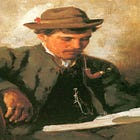These days, we know George Orwell as the writer of Nineteen Eighty-Four. (“It’s a warning, not a handbook!”) However, shortly before he began earnest work on that task, he wrote Politics and the English Language, in which, among other things, he tells us to list towards words that stem from the tongue of old Anglo-Saxons. Such words, he wrote, are shorter, stronger, sterner, and brighter than those that come to us through the speech of the Greeks, Romans, and French.
Speaking this way is not hard. When we talk and tell tales, most of us already heed to Orwell’s reed. (Of course, we do not often say “heed,” let alone, “reed.”) At the same time, writing without words with outlandish forefathers takes some care. I, for one, find it toilsome to forbear from writing use and employ, both of which came to us from the land of the Franks.
Still, doing this from time to time is good for my English. Good words that have lain hidden in the nooks of my head come to the fore, and my writing is fresher for it. So, if you want to improve your working vocabulary - I mean better your working word-hoard - write as if you were speaking with Hrothgar, Wiglaf, or Holy Friðeswiðe.
For Further Reading:
To Share, Subscribe, or Support:
Mark Well:
If you like this pod, you will love this longer work by Ed West.







I appreciate this advice. The English language was Churchill's original love. He would sometimes say words out loud in his quiet moments, chewing on the word and rolling it over in his mouth as if relishing a fine Romeo y Julieta.
Really good advice! English can be a beautiful language and I’ve always been fond of kennings. Do you have a list of vocabulary we should add? Just for fun! I’m curious